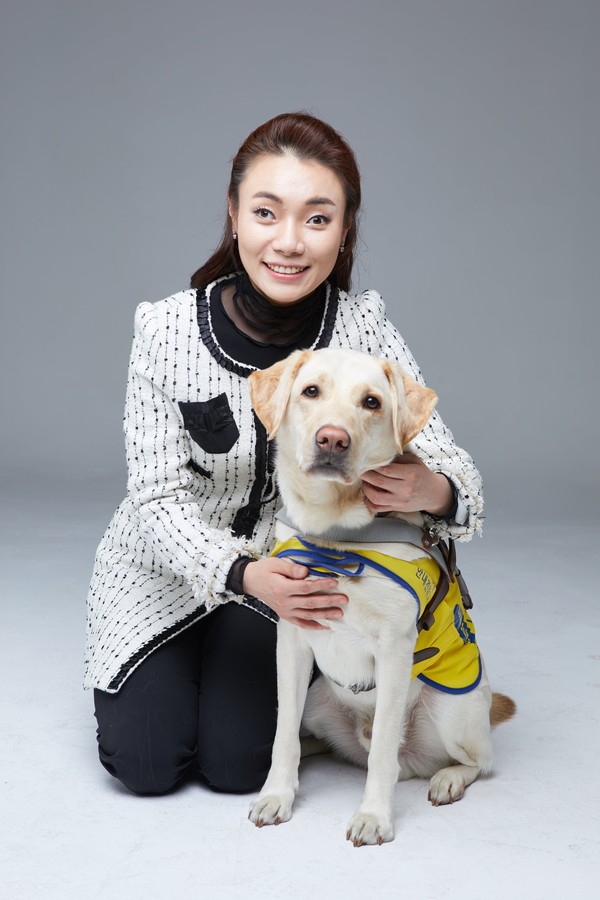
Have you ever chosen a person who will represent you on national issues? Through elections, a leader who reflects people's voices and determines national affairs is elected. Here's one person who used to deliver messages by playing the piano but now has the role of conveying people's voices to the National Assembly. She communicates with people by revealing numerous unknown voices to the world through words, music, and raising questions. SMT met pianist Kim Yeji, who is a Member of the National Assembly of the People Power Party (PPP).
Before beginning the interview, please introduce yourself and your career to our readers.
Hello, I'm glad to meet you, Sookmyungians. I'm Kim Yeji, a Member of the National Assembly of the People Power Party. I became a freshman in 2000 at SMWU, majoring in piano. Then, I completed my master's degree in music education at SMWU and went to study abroad in the USA. After returning from studying abroad, I have also taught students at SMWU in the Department of Piano. In the meantime, I received a proposal for talent recruitment in 2020 and went through the 21st South Korean Legislative Election. Being elected to the National Assembly, I'm now an official member of the People Power Party and a member of the 21st National Assembly's Culture, Sports and Tourism Committee.
After graduating from the Department of Piano, you did a master's degree in music education. Why did you study music education, and what was the most memorable class in SMWU that helped you in piano concerts after graduation?
First, the reason I did my master's degree in music education was that I realized the importance of education which I had felt through many experiences. Moreover, I wanted to be helpful to the juniors after gaining more in-depth academic knowledge and increasing my experience. Secondly, my most memorable class at SMWU was from my major, piano lessons. Through the passion and abundant ideas of the professors and music, I was able to learn and experience how to communicate with the audience by expressing emotions which helped me a lot at piano concerts afterward.
To work as a pianist, you must have put in a lot of effort. Please explain what difficulties you had and how you overcame them.
I had a hard time because there was no sheet music printed in Braille which I needed to play many songs. Currently, the situation in Korea has improved remarkably and most of the sheets of music that students usually play are available, but there were only a few prepared in the past. I had to solve this problem by purchasing the necessary sheet music and requesting it from a Braille sheet music organization in Japan. However, I had another big difficulty in that I had to wait at least three months for the sheet music I requested, so I couldn't see the sheet music whenever I wanted to play various songs.
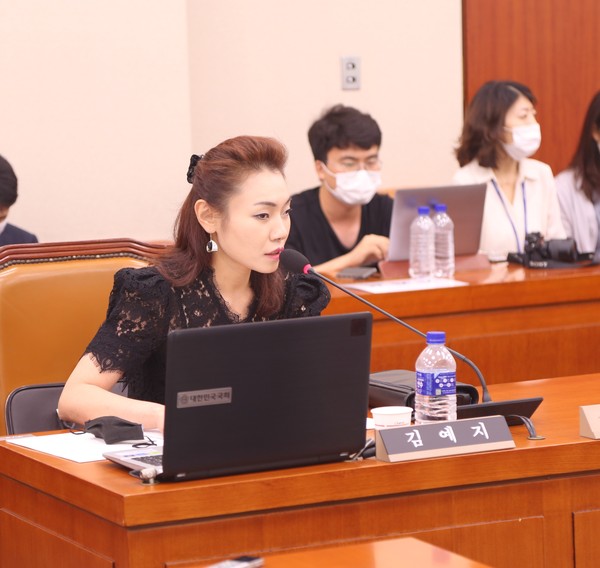
You worked in various fields, not only in music such as a lecturer or director but also in sports such as biathlon, cross-country skiing, and so on. What made you interested in these fields besides the piano?
I'm full of curiosity about many things. Therefore, the reason why I became interested in various areas is nothing special but just a part of my daily life. Due to my curiosity, I was also able to win a bronze medal in biathlon and a silver medal in cross-country at the National Winter Para Games held in 2020.
Then, for what reason did you decide to become a member of the National Assembly while you were active in the field of music and sport?
I used to play the piano in the National Assembly sometimes. At that time, Han Sunkyo, a representative of the Future Korea Party, called me and I thought he was asking for me to play in the National Assembly. However, instead, he offered to recruit me to the Party. I answered that I would think about his offer, but then without thinking for a long time, I said that "I would do it." I used to worry about the issues related to the disabled, but they were not issues that received attention from the public, so they could not improve. Therefore, I thought this was an opportunity to solve those issues and that's why I accepted the offer.
Immediately after being elected as a member of the National Assembly in 2020, you went through struggles in entering the National Assembly's plenary session with 'Joy,' your guide dog. Please tell us more about the incident.
Actually, there was no problem with entering the Assembly plenary session, but it was reported like that by the media. Under the Act on Welfare of Persons with Disabilities, there is a basis for the legitimate access of rehabilitation assistance dogs, including guide dogs, so there was practically no problem. Still, due to this, it was good to make people aware of guide dogs. Many people did not know that guide dogs could enter and use all public places and transportation.
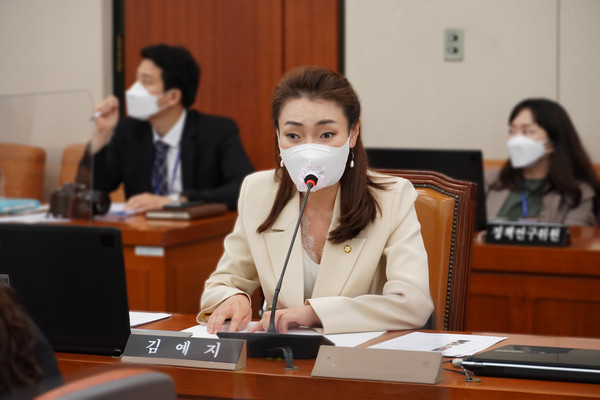
In addition, what difficulties did you experience as a member of the National Assembly and how did you overcome them?
When I first entered the National Assembly, I received support both from assistants who could translate Braille and used a Braille printer and a laptop with voice support. However, reading Braille and the audio materials was time-consuming and difficult. Now, I am overcoming this by preparing early for the materials that I need.
Furthermore, please explain the other bills that you proposed.
During the first two years of the National Assembly, I proposed about 131 bills and 1 resolution. Among them, 20 revised bills and 1 resolution were passed by the National Assembly. Being a member of the Culture, Sports and Tourism Committee, I actively proposed bills related to women and the arts as well as disability-related bills. Recently, I proposed a bill to amend the Public Performance Act to promote the establishment of plans and implementation of policies that reflect changes in the performing arts environment. I also proposed a resolution calling for the ratification of an optional protocol designed to effectively promote the Convention on the Rights of Persons with Disabilities.
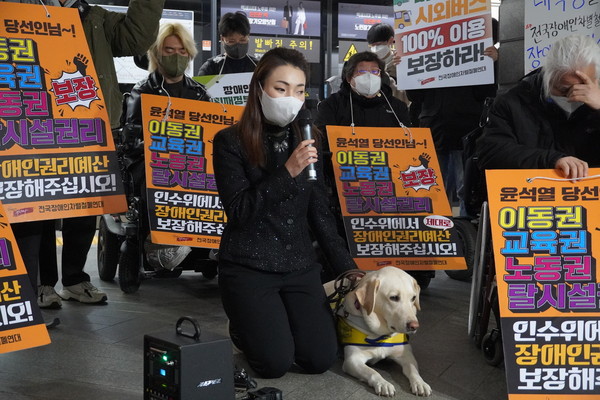
What is your most memorable experience while working as a member of the National Assembly?
Every experience is precious and meaningful. If I have to pick one, it is the time when experiencing the implementation of passed legislation. It is a meaningful time regardless of the passage because it can elicit various emotions. To give two examples, through the revision of the Public Official Election Act, the contents of the Braille bulletin have become the same as the booklet-type bulletin, and they are provided as digital files in portable storage devices. In addition, as the revised Pharmaceutical Affairs Act was passed, emergency medical supplies that can be purchased without a prescription now include Braille or voice-converting barcodes. Also, although the revision of the Food and Cosmetics Act has not yet been passed, companies that have shown sympathy for its importance through press releases are already labeling foods and cosmetics in Braille.
What is your goal as a member of the National Assembly?
What I've been doing for two years is to raise questions about what's necessary for a small number of people, but not known, and to come up with legislative policy improvements or grounds for them. This is also the goal for the rest of my term.
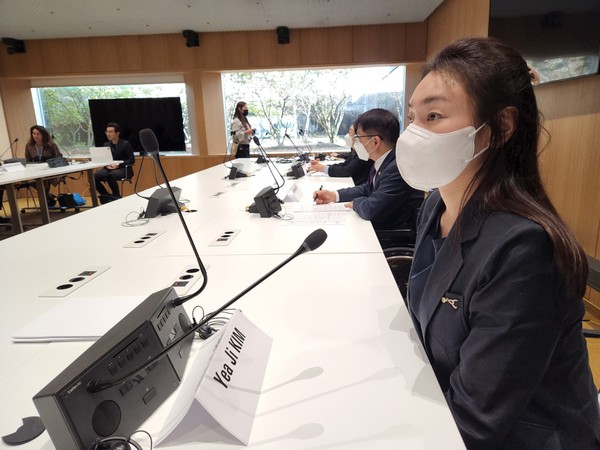
You have mentioned that you plan to return as a performer two years after your term ends. Why are you planning so and what does music mean to you?
Before becoming a member of the National Assembly, performing was my main job, so it is natural to go back to it. However, there are still things I want to learn and challenge myself with in various fields, so if there is an opportunity, I may try another job or field. So, my future is still full of questions. Music in my life means life itself. Music means a lot to me because I can communicate with society by expressing myself through music and can deliver a message that only I can convey.
Lastly, please give a final message to Sookmyungians who are challenging themselves in various fields and who are dreaming of becoming female leaders.
I'm not a good, perfect leader. So, rather than giving advice to Sookmyungians, I would like to say that even I am still living a life of struggling, falling, failing, and learning. I believe that position does not determine success. I also think that there is no end to learning. As a person who always has something to learn and experience, I will promise you that I will do my best in everything by learning and realizing various things. Also, I will join the challenge and fail together with you all the time without giving up. Although it is a tough time, if we are together, we can continue to hope that the gentle power of people who change the world will someday become light.

KIM YEJI
- Sookmyung Women's Univ., (B.M.) Piano
- Sookmyung Women's Univ., (M.M.) Music Education
- Johns Hopkins University, Peabody Institute (M.M.) Piano
- University of Wisconsin-Madison (D.M.A) Doctor of Musical Arts
- 21st National Assembly Member (List Member/People Power Party) (2020.05~)
- 21st National Assembly Culture, Sports and Tourism Committee Member (2020.07~)
Yoon Kim Eunji / Woman Sector Editor
smt_kej@sookmyung.ac.kr
Kang Kim Hyojung / Reporter
smt_kkhj@sookmyung.ac.kr


